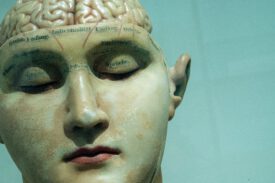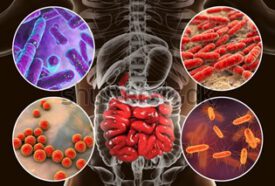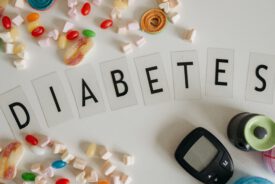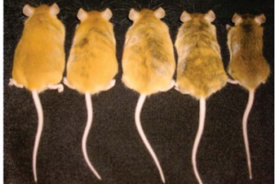How to do a brain transplant without brain transplantation
When you get really sick and one of your organs can’t do its job anymore, one medical technique is to have a transplantation. This is often the case with kidneys and livers, but you can also get a new lung or even a heart. As there are many illnesses affecting the brain, one might wish for brain transplants as well, but as for now they only appear in science fiction stories. However, new research shows there might be another way. In recent years the connection between brain and gut has become more and more prominent in research, and scientists all...
Differences in the Microbiota of Patients with ADHD (Attention Deficit/Hyperactive Disorder)
When we think about someone with ADHD, we don’t automatically think about what’s living in his or her gut. Still, recent research has shown that there might be some differences between the gut bacteria of adults with ADHD, compared to those without ADHD. This can help us to better understand what causes ADHD, and develop new treatments. Attention deficit/hyperactivity disorder (ADHD) is a neurodevelopmental disorder that involves symptoms of inattention, hyperactivity and impulsivity (1,2). Due to these symptoms, someone with ADHD may experience problems at work, school and/or family or personal relationships (3). ADHD is quite a prevalent condition, affecting...
The Gut Microbiome, The Brain, and Cognitive Development in Infants
Humans are capable of complex activities such as decision-making, using tools and forming societies. The human body consist of 30 trillion cells that have differentiated to give each body part its unique properties. Human cells are the pillars that enabled man to go to the moon, design massive computers, genetically modify plants, eradicate diseases and reach the golden age of mean 85.7 years. But let us tell you the truth: this is only half the story! The human body is home to 39 trillion bacteria that, collectively with other microbes, are called our microbiome.1 So, does that mean that we...
How Gender Effects Your Behaviour and Gut
There are many biological differences between men and women. This does not only include physical appearances, but also for instance mental health [1] [2]. For example, whether you are biologically a man or a women can influence your risk of developing a particular mental condition such as depression or ADHD. In this blog I will discuss how differences in biological sex* are linked to differences in the gut microbiome and problem- and prosocial behaviour. Differences in problem- and prosocial behaviour Sex differences have not only been found in clinically diagnosed mental disorders, but also in behavioural problem- and prosocial behaviour...
When Healthy Eating becomes too much – Orthorexia Nervosa
We all know that healthy eating is good for us. But when healthy eating becomes an obsession, this can be harmful. This condition is called orthorexia nervosa. As part of the APPetite-study (work package 3 of the Eat2beNICE-project) I completed my master thesis investigating the role of emotion (dys)regulation, negative affectivity/mood, depressive symptoms, and impulsivity in relation to symptoms of orthorexia nervosa. In this blog I will explain what role mood and emotions play in this condition. What is orthorexia nervosa? Healthy nutrition is important for physical and psychological wellbeing [1, 2]. However, a mental obsession with eating healthy can...
Remedies for Winter Depression – Seasonal Affective Disorder (SAD)
“BRACE YOURSELVES – WINTER IS COMING!” As this quote from a famous TV series correctly predicts, the winter season is approaching. With already shorter days and cooler temperatures, autumn is slowly making space for the upcoming season. While winter often brings beautiful snow, calmness and cozy evenings with tea and biscuits, it sadly also brings the so called “winter blues” for some. But there’s also good news, because there are several ways to lift your mood during these cold and dark months. What is commonly known as winter blues is a sub-form of seasonal affective disorder. It is a recurrent...
How Cigarette Smoke can HARM your Gut
The effect of cigarette smoke is not only bad for your lungs, but your gut microbiota also suffers significant damage. The intestinal microbiota is the collection of microorganisms present in our intestine. Its balance can be altered by many environmental factors such as eating habits, the consumption of drugs (such antibiotics) and toxins, including cigarette smoke (1,2). Nicotine is known to be inhaled into the lungs and rapidly absorbed from the lung alveoli, but it is also absorbed through the skin and gastrointestinal tract. Once nicotine is absorbed it can exert multiple favourable and unfavourable physiological effects, such as increasing...
The link between diabetes and mental disorders – what we have learned from mice
The global incidence of diabetes has increased significantly in recent years and continues to grow.For many patients, it is not only a physical and emotional burden, but also a financial problem due to a long-term, often lifelong treatment. There are two main types of diabetes, based on their causal factors: Type 1 of diabetes (T1D) is characterized by deficient insulin production and requires daily administration of this hormone. In the case of type 2 of diabetes (T2D) the insulin production is not the problem, but instead insulin receptors don’t respond well to the insulin molecule. This is called insulin resistance...
How Diet Influences Gene Expression
Note: Image adapted from Dolinoy, Weidman, Waterland & Jirtle 2006 in Enviromental Health Perspectives [2]. The human body consists of more than 200 different types of cells, but all cells contain the same DNA code. How is it possible that the same code tells the various types of cells to be different? The information for life is not only coded in the DNA, but also on the DNA. Chemical attachments, which are called DNA methylation, can “turn off” part of the DNA code that are not needed in a specific cell. DNA methylation can also be influenced by our surroundings...
Following a “Healthy” Diet May Benefit Cognitive Performance in Middle Age and Beyond
Recently, a research group in Australia published an interesting paper where they compared earlier published findings assessing the impact of different diets on cognitive health. In this blog I will summarize the most important findings of this study, as it has valuable implications for the work we are doing with the Eat2beNICE project. What was the reason for this research and key objective? Cognitive health, meaning how well we think, learn, and remember, is an important component of maintaining our quality of life, social and economic well-being. Our cognitive health declines as a normal part of the aging trajectory. However,...









